Summary
- Profile Type
- Technology offer
- POD Reference
- TOCH20241107009
- Term of Validity
- 7 November 2024 - 7 November 2025
- Company's Country
- Switzerland
- Type of partnership
- Research and development cooperation agreement
- Targeted Countries
- All countries
Contact the EEN partner nearest to you for more information.
Find my local partner
General information
- Short Summary
- Swiss Research Center offers modular Collaborative Base Cells (CBCs) for researchers to focus on challenges in manufacturing rather than technicalities. With plug-and-play design, programming, and advanced Artificial Intelligence and control algorithms, CBCs aims for advancing human-robot collaboration for flexible automation. The center is looking for research&development cooperation agreement with other research institutes and manufacturing companies to apply CBCs for smart manufacturing.
- Full Description
-
The Swiss Research Institute for advanced robotics seeks research collaborators to explore areas like Learning from Demonstration (LfD), human-robot collaboration, and cobotics in industrial settings. Their mission is to bridge the gap between research and industrial deployment using their state-of-the-art Collaborative Base Cells (CBCs).
What are CBCs?
CBCs are modular, flexible robotic workstations designed for rapid integration, prototyping, and deployment in real-world environments. These cells enable the institute to conduct research, test concepts, and demonstrate the potential of robotics in industrial applications.
Why Collaborate with Them?
The institute has a robust infrastructure with ten fully equipped CBCs, containing robotics hardware from top manufacturers like KUKA, ABB, Universal Robots, Fanuc, and Omron. These cells also include peripherals like cameras, grippers, and feeder systems, all integrated to ensure seamless operation.
Their proprietary software platform makes robot programming easy. Utilizing programming languages like Python and ROS 2, their setup allows researchers to focus on challenges rather than technicalities. The CBCs are designed to enable intuitive programming, reducing the complexity of deploying new robotic applications.
Research Focus Areas
The institute has extensive experience in cobotics and collaborative robotics. Their core expertise spans robot learning, human-robot collaboration, and scalable automation solutions tailored to real-world demands. The mission to translate theoretical research into deployable applications makes them a key player, working with partners to address challenges in smart manufacturing.
• Learning from Demonstration (LfD):
The research aims to enable robots to learn from human demonstrations, reducing time and cost for complex tasks. Researchers can access tools that help robots learn, refine, and generalize skills, making them suitable for flexible, low-volume manufacturing.
• Optimization, Control, and Path Planning:
They develop advanced algorithms to optimize robot movement, control, and path planning, improving efficiency and precision in manufacturing. Researchers leverage the CBCs to implement these methods, enhancing productivity while maintaining safety.
• Human-Robot Collaboration:
The institute explores improving reactive control, adaptive responses, and user-friendly interfaces for safe, effective human-robot collaboration.
• AI and Machine Learning for Robotics:
The institute leverages AI and machine learning to enhance robotic decision-making, adaptability, and performance. Researchers can apply advanced algorithms to improve robot perception, autonomy, and task execution for reactive smart robot skill generalization. With CBCs, machine learning models can be tested and refined in real-time to advance capabilities in complex decision-making in manipulation.
Collaborative Opportunities
The institute seeks research partners—universities, R&D institutions, and technology providers—eager to explore robotics frontiers. Whether interested in fundamental research or applied studies, the CBCs offer a ready-made environment to bring concepts from theory to practice. Their modularity and intuitive interfaces make them ideal for academic and industrial projects.
How Cooperation is Envisioned
Collaborations involve direct access to CBCs for hands-on experimentation and joint development. Practical organization includes shared laboratory access, co-development of prototypes, technical workshops, and resource-sharing to foster successful outcomes. This structure ensures mutual benefits for academic and industrial partners.
Why is their setup unique?
Their setup is unique due to its modular design and plug-and-play architecture, allowing rapid reconfiguration across different tasks. With intuitive, Python and ROS2-based programming, CBCs make advanced robotics accessible and scalable for diverse research and industrial applications. - Advantages and Innovations
-
• Modular and Plug-and-Play Design: CBCs allow for rapid reconfiguration and integration of various tools, sensors, and robotic systems. Unlike traditional setups requiring dedicated hardware for specific tasks, CBCs enable effortless switching between applications and significantly reduce setup time.
• Intuitive Software and Open-Source Compatibility: Equipped with Python-based programming and ROS 2 support, CBCs eliminate the need for complex, proprietary systems, allowing even non-specialists to control and reprogram robots quickly and efficiently.
• Learning from Demonstration (LfD): CBCs support LfD, enabling robots to learn tasks directly from human demonstrations without extensive manual programming. This is especially valuable in high-mix, low-volume environments, allowing robots to generalize skills across different tasks.
• Advanced Optimization and Control Algorithms: The CBCs feature built-in capabilities for path planning, control optimization, and trajectory efficiency, enhancing productivity while maintaining safety. These algorithms make CBCs ideal for complex or repetitive tasks where traditional robotic cells may fall short.
• Human-Robot Collaboration and Safety: CBCs are designed to support adaptable and safe interaction between humans and robots, with features like reactive control and customizable interfaces. This adaptability reduces downtime and enhances safety compared to conventional robotic setups, which are less responsive to human interactions.
• Scalability Across Industries: The modular design of CBCs allows easy adaptation for precision assembly, quality control, and material handling across various fields such as watchmaking, automotive, and electronics. Unlike specialized traditional cells, CBCs provide flexible scalability, catering to both research and industrial production needs. - Stage of Development
- Available for demonstration
- Sustainable Development Goals
- Goal 12: Responsible Consumption and Production
- Goal 9: Industry, Innovation and Infrastructure
- IPR status
- No IPR applied
Partner Sought
- Expected Role of a Partner
-
The center seeks research institutions and universities as research partners and implementation partners from SMEs and large companies focused on flexible automation solutions.
Specific Areas of Activity:
Targeted fields include robotics, automation, smart manufacturing, mechanical engineering, precision engineering, watchmaking, packaging, lab automation, and industries with complex process requirements.
Tasks Expected from the Partner:
• Research Partners (e.g., universities, research institutions):
Conduct jointly with the center applied research in robotics, vision systems, and mechanical engineering to advance CBC capabilities.
• SMEs and large companies:
Collaborate by presenting industrial challenges, developing innovative solutions that need research, develop and supply hardware and software for research and CBCs for modular and adaptive automation. - Type and Size of Partner
- SME <=10
- University
- SME 50 - 249
- R&D Institution
- Big company
- SME 11-49
- Type of partnership
- Research and development cooperation agreement
Dissemination
- Technology keywords
- 01001001 - Automation, Robotics Control Systems
- 01003020 - Building Automation Software
- 01003003 - Artificial Intelligence (AI)
- 01003013 - Information Technology/Informatics
- 01003018 - User Interfaces, Usability
- Market keywords
- 09003001 - Engineering services
- 08002007 - Other industrial automation
- 02007016 - Artificial intelligence related software
- 08002004 - Robotics
- 09004008 - Other manufacturing (not elsewhere classified)
- Targeted countries
- All countries
Images
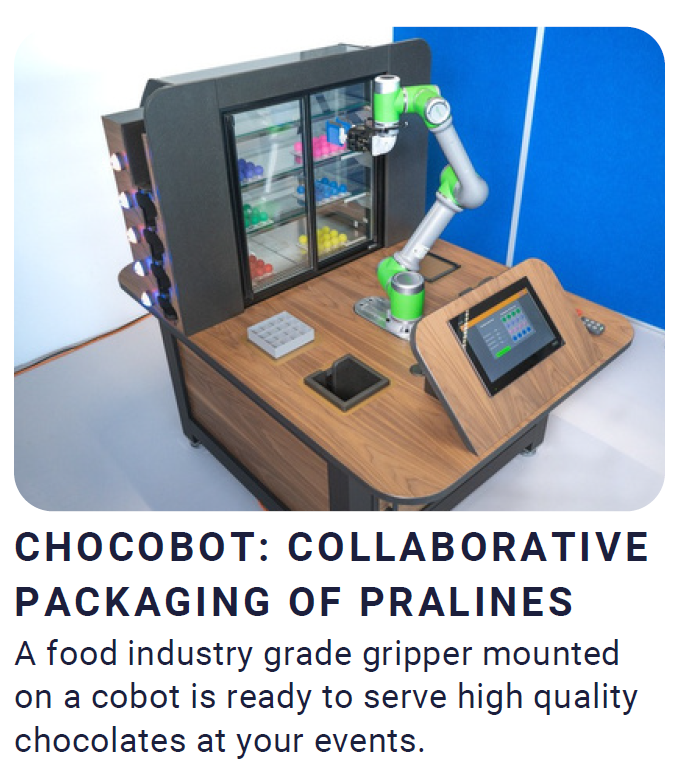

chocobot_collaborative_packaging_of_pralines.png 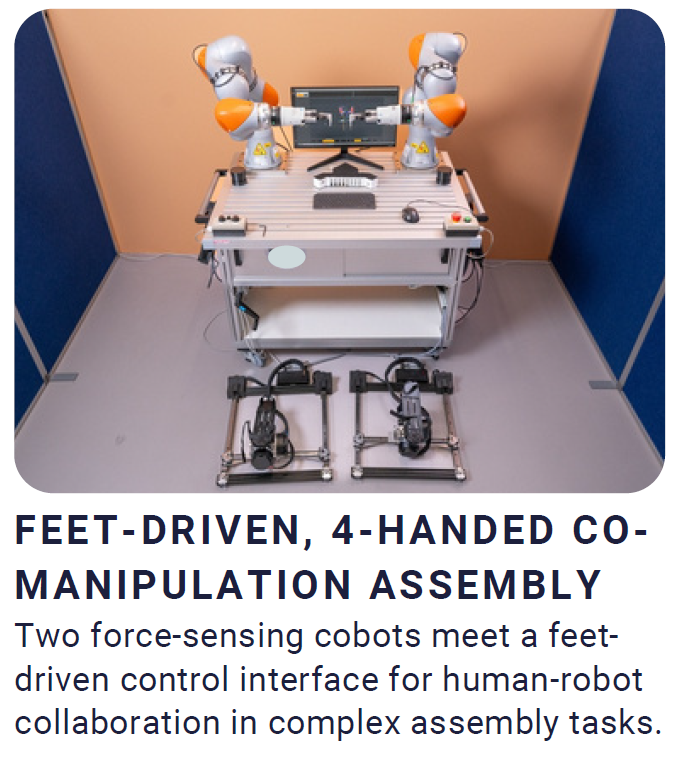

feet_driven_4-handed_co_manipulation_assembly.png 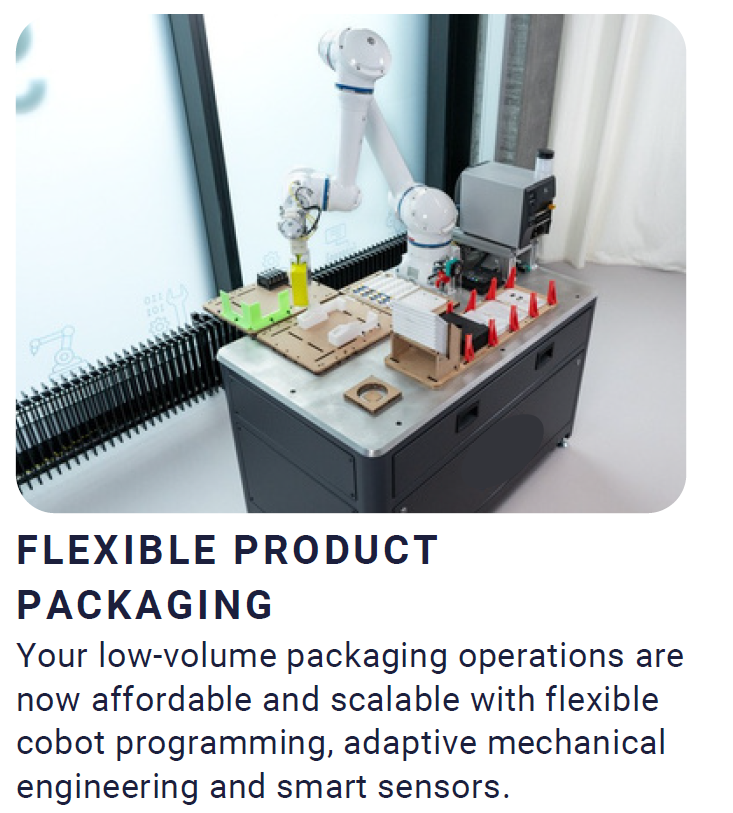

flexible_product_packaging.png 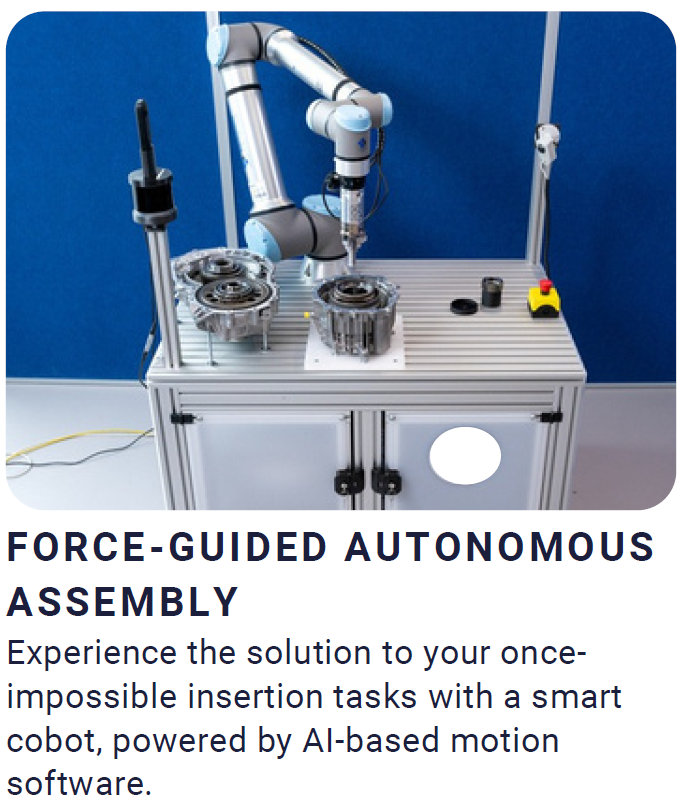

force_guided_autonomous_assembly.png 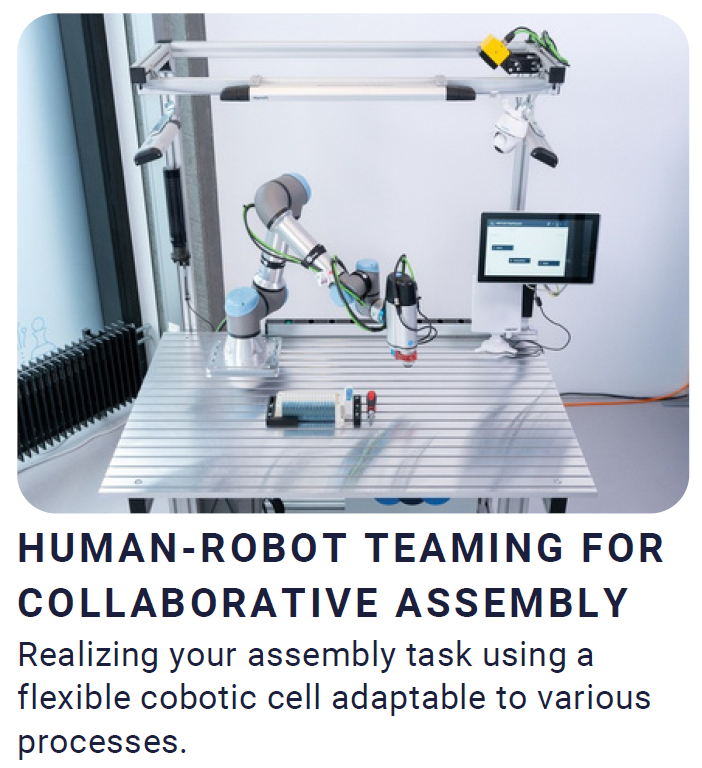

human_robot_teaming_for_collaborative_assembly.png 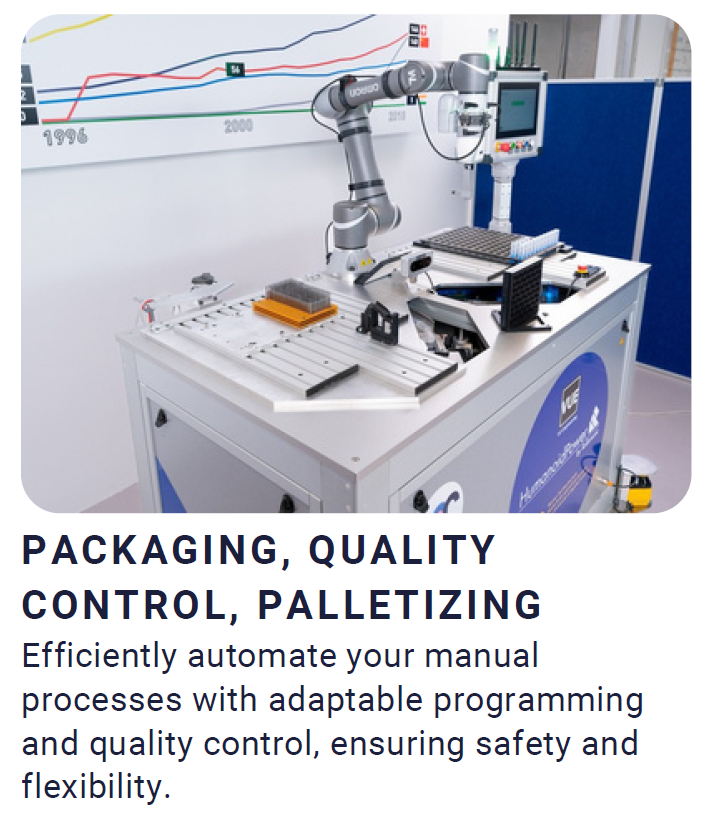

packaging_quality_control_palletizing.png 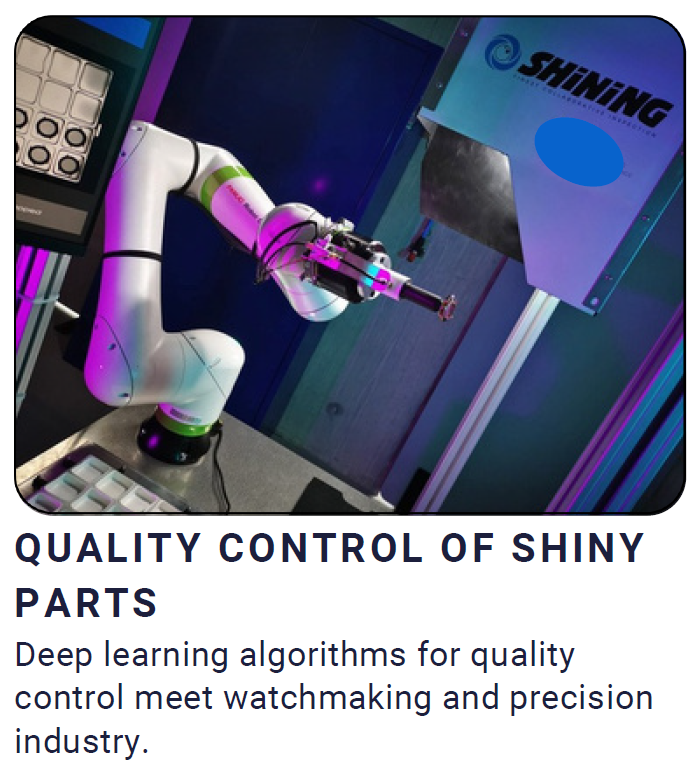

quality_control_of_shiny_parts.png 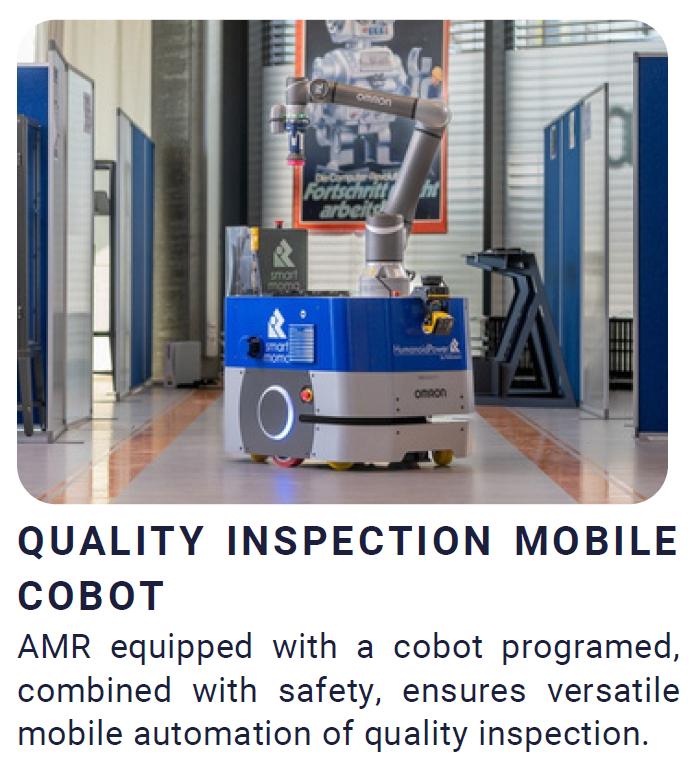

quality_inspection_mobile_cobot.png 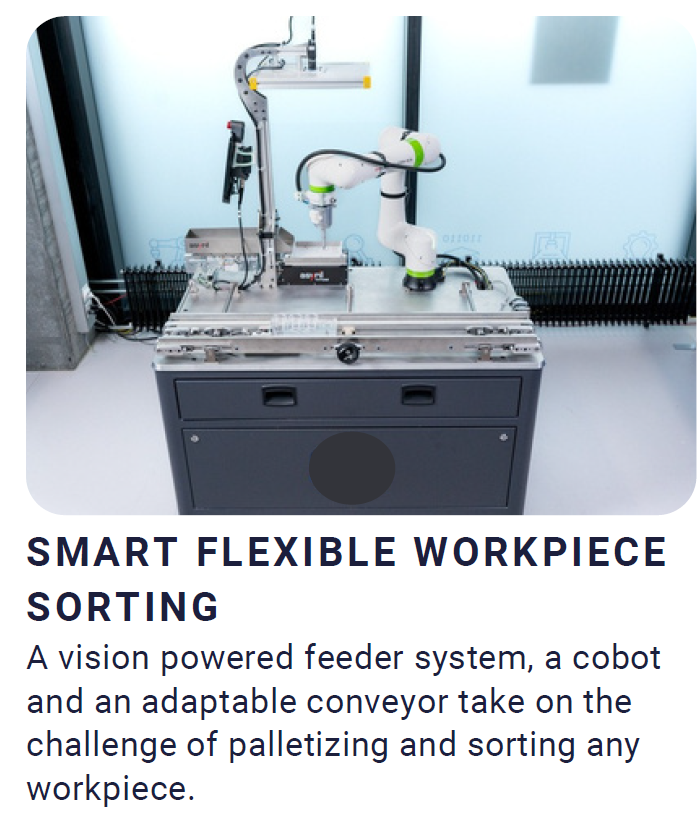

Smart_flexible_workpiece_sorting.png 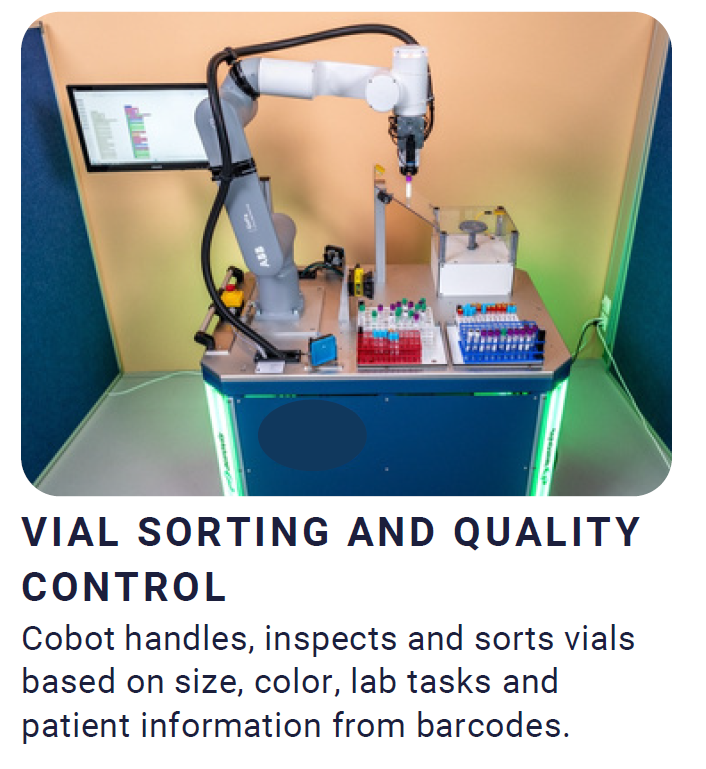

vial_sorting_and_quality_control.png